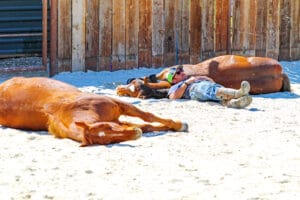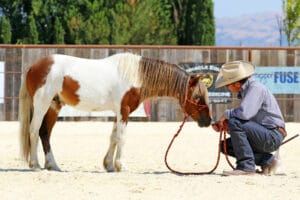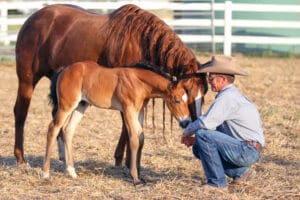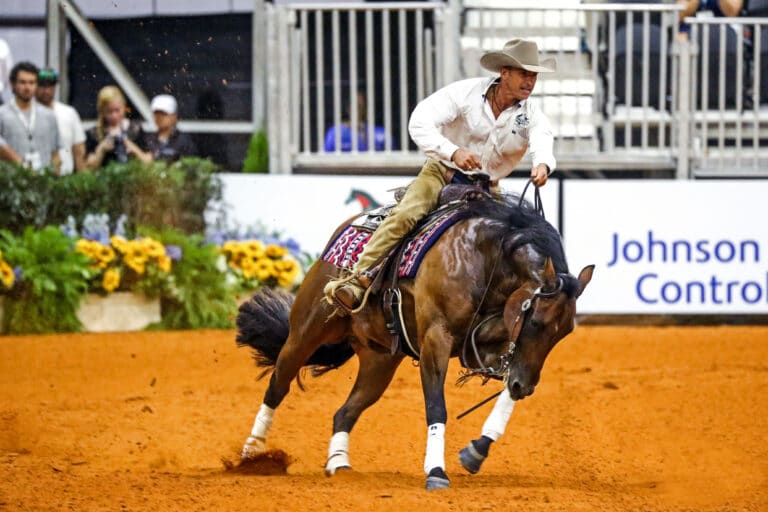Take expert horsemanship, mix with mindfulness and a belief in putting dreams out to the Universe. Add a serve of serendipity, plus a willingness to go with the flow, and, writes AMANDA MAC, you have the extraordinary life of Warwick Schiller,
Warwick Schiller still remembers the day the barley burnt.
He and his two brothers all rode, their lives following a well-ordered pattern. “Get up in the morning. Go and feed your horse, clean the stall, go to school. Come home and grab the barley pot that you put outside the back door when you came in from the stables that morning. Bring it inside, fill it with water, put it on the stove and turn it on high. Get changed, have something to eat and by that time the barley pot is boiling so you turn it down low, go riding and when you’re done the barley’s cooked and ready to be mixed with your horse’s feed,” Warwick pauses for breath.
The three boys had that system down pat, taking it in turns to get the barley cooking. But systems can sometimes be disrupted: “One day one of us put the pot on the stove with no water in it. It was an aluminium pot and the bottom got burned out of it. There was molten aluminium all over the stove and the stench of burnt barley was right through the house. Do you know what burnt barley smells like?” he asks me. I do, as it happens, and the word ‘foul’ comes to mind. “Well, Mum comes home from work,” he continues, “it’s dark and it’s winter and it’s cold out – and she finds every door and window in the house open to try to get rid of the stench. It got into the curtains, everywhere. We only made that mistake once!”

But that was a long time ago and much has changed since those early days growing up on a 1,200 acre sheep and wheat farm near Young, NSW. Now this particular boy from the bush lives stateside, has twice competed for Australia in the World Equestrian Games, is recognised as an expert reiner and trainer, travels the world giving clinics, hosts a podcast, has 94,500-odd subscribers to his YouTube channel, and has just celebrated 20 million views. How did that happen? Warwick’s pretty sure that it has a lot to do with serendipity.
But back to the bush: “Dad had ridden in rodeos, but by the time I was old enough to remember anything he was just into calf roping. He worked on the farm, we didn’t own it but we lived there,” he explains, “and there were always horses around which were used for mustering the sheep.”
It turns out that all three Schiller brothers competed at shows. Warwick recalls breaking his arm at the West Wyalong Rodeo in the calf ride when he was around 10 years old: “But it was my oldest brother in particular who was very competitive and very, very good. We started out going to Pony Club and then went to the Quarter Horse shows in the late 70s. He was in the show ring, and pretty much won everything that you could win.”
And Warwick had his share of outings too: “You competed your horse in every event but it wasn’t specialised. You’d do a bit of jumping, a bit of barrel racing, reining – we could ride but we didn’t know how to teach a horse to do stuff. There wasn’t anything in the way of a process,” he recalls. “And the reining looked nothing like it does these days. But I’d seen magazines and videos from America and the things those horses could do were unbelievable. I thought it was amazing. I think the Reining Association started in Australia around 1989 and I was at their first show. I didn’t have a horse there, but I was really interested in it.”
Other than horses and riding, school loomed large. Not a huge fan of that particular institution, Warwick’s report cards generally included the comment ‘he’s very bright but needs to apply himself’. “It took me ‘til I was about 45 or so to change that attitude,” he admits.

Warwick joinsChance and his paddock mate Sherlockfor a napin the arena
By the time Year 12 rolled around, Warwick had demonstrated an aptitude for maths, and along with other students who showed similar ability, was encouraged to send job applications to the various banks in town – and the Commonwealth came up trumps. “Growing up in rural NSW, the whole thing was that you went to school, you got a job, you got married, you had kids, and then you died. That was pretty much life,” Warwick says. “No one we knew went to university – that was for other people.”
So did he take the job? “Sure did, and I was about the same at the bank as I had been at school! It was just something to pass the time. I was with the bank for six years and every 18 months or so they’d transfer you to a different town. I did a stint out in Ivanhoe, just north of Hay. I was about 20 years old. The pub was next door to the bank, you finished work at five in the afternoon, played footie on the weekends, and drank some beers. I was pretty aimless.”
But after bank staff had worked in a remote placement, which back in the day Ivanhoe certainly was, they could pick their next location, and attracted by its big Quarter Horse community, Warwick opted for Wagga Wagga. Once there, he got back into riding in earnest.
And it was around about then that serendipity lent a hand. “At that time, if you were of a certain age the bank would give you 12 months leave without pay if you wanted to travel abroad, and they guaranteed you a job when you got back,” he tells me.
All well and good, but funding an overseas trip was another thing entirely. And that’s where things get interesting. These days, Warwick is big into manifesting – the concept of putting a goal or dream out to the Universe and waiting to see what comes up. Not that Warwick knew anything about that at the time, but he did dream of going to the US to learn more about reining – and looking back on it, he reckons the way he financed that trip was the first time he’d manifested anything. “I had a Holden F100 ute I’d bought from a mate for $5,000, but the NRMA were happy to insure that particular year make and model for $10,000, so I did. I remember on three separate occasions telling three different people that if I knew how to write the car off without killing myself, I would. I’d take the money and go to America.”

Getting to know you: Calvin and Warwick at a recent clinic
Now, call it coincidence if you will, but three months later Warwick was driving along when his left front tire blew out, sending him off the road and into a stand of small gum trees. He was travelling just fast enough to write the ute off, yet opened the car door and stepped out unscathed. So in 1990, he went to America, landed a job with a horse trainer and worked there for a year.
Of course, these day it’s common knowledge that many great athletes train with a mental skills coach or sports psychologist in order to master the psychological aspects of their respective sports. For example, Kobe Bryant and Michael Jordan both worked with a mindfulness meditation coach – so it’s a bit of a given that mindset plays a big part in what you can achieve. Warwick knows that now, but he didn’t back then. “At school I didn’t apply myself, nor at the bank, and I’d say that had a lot to do with never really believing in myself. So on the day I left the US to go home, the guy I’d been working for told me if I wanted to come back, he’d give me a job. ‘You could do this for a living if you wanted to’ he said. Well, I’d never given that a moment’s consideration. I thought that was for other people,” Warwick recalls.
Although somewhere in the back of his mind he wished that he could do that, he says lack of self-confidence made it seem impossible. “The way I felt about myself was that everyone else had what it took, but I didn’t.”
But this time there was another motivating factor: “I’d met a girl, Robyn, who’s now my wife. I’d chased her all year but she ran like a scalded cat!” he laughs. “So when I came back to Australia I had two reasons to go back to the US, one was the job and the other was Robyn.”
Back in Australia and working for the bank again, Warwick kept in touch with her, not with phone calls so much – too expensive in those days – but with plenty of letters. Six months later, he returned to the US, to Robyn, and to his job, where he worked for the next two years training client’s horses, frequently competing with them in the Western show ring.
But by then, Robyn (who showed in Western pleasure herself) and Warwick were married and it was time to move on. After working for a Quarter Horse breeder for a year Warwick decided to go out on his own. “We moved back to Robyn’s home town south of San Francisco, where we still live today. We found this almost empty agistment centre. There were a few horses there and a big covered arena plus one hundred or so stalls. So I started training out of there as well as going to people’s homes to ride their horses in their own backyards. I’d charge by the ride – not training for reining necessarily, they might just be horses that need a bit more education,” he tells me.
By 2001, the business had grown and the Schiller’s now had a son, Tyler. It was during that year that Warwick spent a lot of time driving from one side of the country to the other showing a horse, eventually winning Reserve World Champion. “The next year Robyn did the same thing with a client’s horse,” he tells me, “but by that time Tyler had started school and I got to thinking that the better you get at this stuff [reining] the more you’re gone from home and that really wasn’t the best thing for our son. So during 2003 we put it out to the Universe that we’d like to do something different so we weren’t away from home so much.”
The Universe must have taken note, because by the end of 2003 Warwick was working for a wealthy client training beautiful horses on a superb property – and that’s what he did for the next three years.

:Warwick and Robyn’s foal Chance with Bella his mum
Then circumstances changed and it was time to try something new. “We thought we’d do something really different. We bought a couple of stallions and moved to Australia at the end of 2006. One of the reasons for the move was that Australia had never been represented in reining at the World Equestrian Games,” he explains. “A number of Australian reiners in the US and Europe wanted to do it, but it had to go through the National Federation and no one in Australia had taken the job on. So Robyn helped Equestrian Australia organise it, we got a team together for 2010, and luckily enough, although it hadn’t been our intention, we both ended up on the team.”
While this was an unexpected bonus, the plan to build a successful long-term breeding program with their imported stallions had been brought to its knees by an outbreak of equine influenza, and by Christmas 2010, the Schillers had returned to the US permanently.
However, when one door closes, another opens – and this particular door was already ajar when the Schillers were still in Australia and serving on the board of Reining Australia. “During a board meeting it came up that Equitana wanted someone to do a reining demonstration. We lived the closest to Melbourne, and we’d got our stallions, so I said I’d go. When Equitana heard we were coming down for the demonstration, they asked whether I’d also do the commentary for their ‘The Way of The Horse’ demonstration,” Warwick explains. “So I spent three days talking to a crowd of three to four thousand people. I just did it to help out, but after that I got a lot of calls from people who had heard me at Equitana, loved the way I explained things, and wanted me to give clinics at their clubs.”
So you could say that it was because Warwick generously donated his knowledge and time with no thought of return, that he now travels the world giving clinics. “I’ve never been much of a planner or organiser, and I’d never thought of doing clinics,” he says, “I just kind of follow whatever the Universe presents to me and it presented clinics – so I did them.”
And while we’re on the subject of the Universe: “I have a friend who recommends an intention, attention, no tension approach,” he adds, “you put the intention out there, you pay attention to the things that might arise because of it, but you have no tension about when it might happen.”
Warwick used the approach when he suggested to the Universe that he’d really like to do a clinic somewhere other than his usual destinations of Europe, Africa, Australia, New Zealand, the US, Canada and the UK. He wanted to go to a location that was exotic. “Anyway, about two months later the wife of the British Ambassador to Morocco emailed to ask if I’d like to go there to work with Barb stallions owned by the Royal Society for the Encouragement of Horses. So last October we flew to Morocco and spent a week living in the British Ambassador’s residence and working with the stallions. We met the Prince of Morocco, who was the head of the Society, and had a jolly old time.” Exotic? Yep, tick that box!
And it was his experience with clinics that stood Warwick in very good stead on his return to the US. “I had to start finding clients all over again. But because I’d been out doing clinics with the average rider and their horse, I’d noticed some of the simple things they had trouble with. So I started making YouTube videos to show how easy some stuff can be. People really liked them and I began doing more and more. Then they wanted longer videos, so I started a library that people paid a subscription to access.”
At the time, Warwick was retraining rearing Warmbloods and bolting dressage horses as well as reiners. So he’d video every session from the day a horse arrived. “It was just like you were sitting on the fence of the round yard watching me,” he says. “I was still re-educating problem horses for clients, but the video subscription side of it grew and I started doing clinics around the world. By mid-2014 I realised that training horses wasn’t generating the same income as clinics. So at the end of the year I stopped the training and concentrated on the clinics and video library.”
Twenty million views says he made the right choice!
Talking with Warwick has been a real treat, but before I let him go, I have a final question: what are the characteristics of a truly great horseman or woman? His answer is fascinating. “I think a lack of ego is a big part. I took a bit of a U turn about four years ago when I realised that I wasn’t interested in the competition side of it anymore, I was interested in connection. I really don’t think that most people realise – because I didn’t for the longest time – just how aware horses are of how aware you are,” he explains, quoting a Ray Hunt adage that goes something along the lines of ‘they know when you know, and they know when you don’t’.
Warwick once thought that meant horses know when you know what you’re doing, and they know when you don’t know. But a couple of years ago, he realised that wasn’t quite the case: “I was reading an article by someone who’d spent a lot of time with Ray Hunt, and he said that when you’re around a horse you need to know what their eyes are doing, what their ears are doing, what their muzzle’s doing, what their breathing’s doing, what their back’s doing, what their neck’s doing, what their tail’s doing – is it tight, is it lose, is it clamped, is it up in the air. And you need to know all those things because they know when you know, and they know when you don’t know.”
So these days, Warwick’s focus is on being present with a horse: “It’s being with your horse and being non-judgementally aware of all of the parts of them all of the time, without naming and blaming and saying that’s good or bad or whatever. And there’s something about that awareness that makes horses relax around you. I’ve being doing a lot of personal growth stuff over the past four years and since then, I’ve found that if someone hands me the lead rope of a horse they’re having trouble with at a clinic, the horse just softens and all the worry goes out of them and I haven’t done anything.”
He tells me that in the past, he’d noticed some people didn’t have to do as much as he did in order to get a good result with a horse: “Now I think it’s because they have a certain energy. The best horsemen I’ve ever met have no ego about them and they’ve got this warm and welcoming energy that I’ve found horses really respond to.”
I suggest it could be described as the horse tuning into you. Warwick agrees: “Yeah, they feel who you really are and it should be a welcoming energy, not a you need to do that, or you have to do this or you’re in trouble approach. It’s more like a ‘hey there, how’s it going’ kind of energy.”
It’s after I’ve thanked him and we’ve said our goodbyes that it hits me: warm and welcoming with a ‘how’s it going’ energy – that’s pretty much Warwick Schiller down to a T.
Fine tune your training and learn to work with the horse you have today. Visit www.warwickschiller.com for more info.
Feature Image: Warwick and Petey competing at WEG 2018(Image byDead or AlivePhotography).



